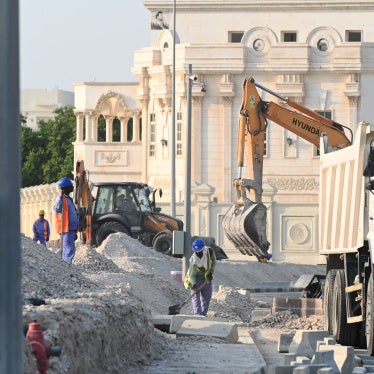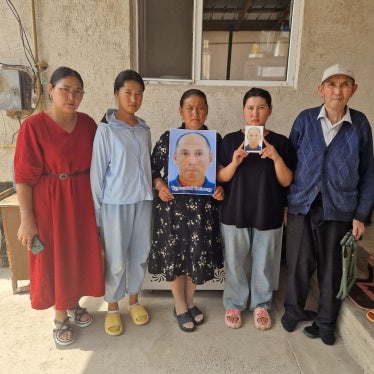(New York) - An Abu Dhabi development company's appointment of an independent monitor for conditions for workers building the Saadiyat Island cultural project is a positive step, Human Rights Watch said today. The Abu Dhabi Tourism Development & Investment Company (TDIC) appointed PricewaterhouseCoopers (PwC), an international auditing firm, on May 31, 2011, to monitor working conditions on the island.
However, additional steps are needed to protect migrant workers' rights on the project, which will include branches of the Guggenheim and Louvre museums, Human Rights Watch said. These include setting publicly-announced penalties for contractors that violate standards, and putting into effect clearly-defined remedies for workers whose rights are violated, including a direct promise to reimburse workers found to have paid recruiting fees.
"By recognizing the need for independent monitoring, the development company has set an example that development projects throughout the region should follow," said Sarah Leah Whitson, Middle East director at Human Rights Watch. "But monitoring alone won't help workers when contractors trample on their rights. TDIC needs to be clear about how it will punish violators, and compensate the workers."
Human Rights Watch called on the development company to use the new monitor to audit labor conditions on all of its Abu Dhabi projects. All United Arab Emirates (UAE) contractors employing migrant construction workers should appoint such third-party independent monitors to monitor labor compliance, Human Rights Watch said.
TDIC said in its announcement that the monitor will interview workers in their own languages, conduct random spot checks, and publish "comprehensive" findings in annual reports available to the public. TDIC should release comprehensive information about the terms of reference and monitoring methodology, to ensure the firm's independence in auditing and reporting, Human Rights Watch said.
TDIC's announcement said that PwC will monitor and report publicly on whether workers' conditions meet the standards set forth in TDIC's Employment Practices Policy (EPP) and UAE labor law, which require contractors to pay workers' recruiting fees; provide health insurance; make on-time monthly wage payments into individual bank accounts; and allow workers to retain personal documents, including passports. However, neither UAE law nor TDIC's policies ensure even some core labor rights guarantees, like the right to strike and organize unions.
The development company has not specified enforcement mechanisms, beyond vague references in its announcement to financial penalties and possible contract termination for violating contractors. Human Rights Watch asked the company in February for specifics about penalties, and whether they have been put into operation for the Saadiyat Island site, but has received no additional information from the company.
Neither the Guggenheim nor Agence France-Muséums - responsible for the Louvre Abu Dhabi - have disclosed how they will ensure that TDIC enforces its labor standards, or the recourse these institutions have in the event that TDIC fails in its labor commitments.
"If TDIC is serious about its promise, it should put its money where its mouth is and guarantee to reimburse workers forced to pay illegal fees," Whitson said.
An international coalition of artists announced on June 2 that their boycott of the Guggenheim Abu Dhabi site would remain in place as they awaited further details of the independent monitoring agreement, as well as information about enforcement mechanisms. They said they had particular concern about enforcing the development company's promise that contractors would reimburse workers for any fees they had paid to obtain their jobs.
Abu Dhabi, the capital of the UAE, seeks to convert Saadiyat Island into an international tourist destination, at a cost of $27 billion. The low-lying island will have four museums and a performing arts center designed by world-renowned architectural firms as well as a New York University campus, golf courses, hotels, and luxury residences.
In March New York University (NYU) and its partner, the Abu Dhabi Executive Affairs Authority (EAA), appointed the UK firm Mott MacDonald to audit and report on compliance with the university's promises for workers involved in the construction of the NYU Saadiyat Island campus. However, neither party disclosed further information about the terms of reference with the appointed monitor, the nature of monitoring methodology, or the remedies if violations are found.
On multiple visits, Human Rights Watch has documented how workers on Saadiyat Island often pay heavy recruitment fees in their home countries to get jobs in the UAE. They often spend several months or even years paying off these debts. Although TDIC pledged that contractors will reimburse workers who have paid such fees in their home countries, it has not specified any remedy for the workers if the employers fail to reimburse them. These recruitment fees, as well as workers' inability to change employers under a system in which the employer sponsors their presence in the country, contribute to conditions of forced labor and human trafficking across the Gulf.
The May 2009 Human Rights Watch report, "The Island of Happiness': Exploitation of Migrant Workers on Saadiyat Island, Abu Dhabi," documented the severe exploitation and abuse of South Asian migrant workers constructing the infrastructure for the cultural centers on Saadiyat Island. Human Rights Watch called on the Guggenheim, the Louvre Abu Dhabi, NYU, and other international institutions to insist on concrete contractual commitments from all companies involved in constructing the campus.
The UAE, as a member state of the International Labour Organization (ILO), is obligated to promote and protect core labor rights. The ILO has declared that these "fundamental" principles are binding even on members, like the UAE, that have not ratified the ILO conventions governing those rights. UAE law does not protect workers who organize and strike and workers who do so face detention and expulsion from the country. As a result, independent monitors will not reflect the extent to which workers rights are still violated, notwithstanding apparent compliance with UAE law and TDIC's policies.
"If TDIC wants to protect workers' human rights, then conditions on Saadiyat have to be measured with an international yardstick," Whitson said. "TDIC's internal policies and UAE labor law neglect important international protections, like workers' rights to organize and bargain collectively."







